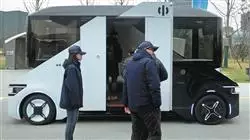University certificate
Accreditation/Membership
The world's largest faculty of engineering”
Introduction to the Program
Un programa exhaustivo y 100% online, exclusivo de TECH y con una perspectiva internacional respaldada por nuestra afiliación con American Society for Engineering Education”

Las ciudades constituyen un nuevo paradigma en el siglo XXI, enfrentándose a grandes retos de la humanidad tales como la superpoblación de las ciudades, importantes transformaciones tecnológicas y mayor accesibilidad del ciudadano a todos los servicios. EstePostgraduate certificate afronta desde una visión a medio largo plazo los retos futuros a los que las ciudades se van a ir enfrentando paulatinamente en transformación digital, ya no solo tecnológicamente, sino en materia de gobernanza y alineación con la Agenda 2030.
De esta manera, se abordará el paradigma del modelo de gobernanza del dato y de la información que se genera e intercambia en las ciudades. Por otro lado, el alumno profundizará en el estudio del concepto plataforma ciudad como sumatorio de diferentes plataformas sectoriales. Lo que permitirá generar un catálogo extenso de casos de uso de valor añadido que respondan a la eficiencia de los servicios sectoriales y a resolver problemáticas de ciudad desde una perspectiva holística. Por último, también se hará hincapié en el nuevo paradigma del modelado de ciudades a través de gemelos digitales que permitan mejorar, rediseñar y crear nuevos modelos de ciudad más eficientes y sostenibles alineados.
Para lograr el objetivo de superación profesional TECH ofrece un programa de vanguardia y adaptado a las últimas novedades del campo, con un temario actualizado y realizado por profesionales experimentados y dispuestos a poner todo su conocimiento al alcance de sus alumnos. En adición, un prestigioso Director Invitado Internacional ofrecerá una disruptiva Masterclass que contribuirá a que los ingenieros desarrollen competencias avanzadas para experimentar un salto de calidad en sus trayectorias.
Gracias a que TECH es miembro de la American Society for Engineering Education (ASEE), sus estudiantes acceden gratuitamente a conferencias anuales y talleres regionales que enriquecen su formación en ingeniería. Además, disfrutan de acceso en línea a publicaciones especializadas como Prism y el Journal of Engineering Education, fortaleciendo su desarrollo académico y ampliando su red profesional en el ámbito internacional.
Un reconocido Director Invitado Internacional impartirá una exclusiva Masterclass que te aportará las claves para implementar la Inteligencia Artificial en proyectos de Smart Cities”
Este Postgraduate certificate en The Future of Smart Cities contiene el programa más completo y actualizado del mercado. Sus características más destacadas son:
- El desarrollo de casos prácticos presentados por expertos en Smart Cities
- Los contenidos gráficos, esquemáticos y eminentemente prácticos con los que están concebidos recogen una información científica y práctica sobre aquellas disciplinas indispensables para el ejercicio profesional
- Los ejercicios prácticos donde realizar el proceso de autoevaluación para mejorar el aprendizaje
- Su especial hincapié en metodologías innovadoras en Smart Cities
- Las lecciones teóricas, preguntas al experto, foros de discusión de temas controvertidos y trabajos de reflexión individual
- La disponibilidad de acceso a los contenidos desde cualquier dispositivo fijo o portátil con conexión a internet
Este Postgraduate certificate es la mejor inversión que puedes hacer en la selección de un programa de actualización en el ámbito de las Smart Cities. Te ofrecemos calidad y libre acceso a los contenidos”
Incluye, en su cuadro docente, a profesionales pertenecientes al ámbito de la ingeniería y la arquitectura, que vierten en esta capacitación la experiencia de su trabajo, además de reconocidos especialistas de sociedades de referencia y universidades de prestigio.
Su contenido multimedia, elaborado con la última tecnología educativa, permitirá al profesional un aprendizaje situado y contextual, es decir, un entorno simulado que proporcionará una educación inmersiva programada para entrenarse ante situaciones reales.
El diseño de este programa se centra en el Aprendizaje Basado en Problemas, mediante el cual el profesional deberá tratar de resolver las distintas situaciones de práctica profesional que se le planteen a lo largo del Postgraduate certificate académico. Para ello, el profesional contará con la ayuda de un novedoso sistema de vídeo interactivo realizado por reconocidos expertos en Smart Cities y con gran experiencia.
Esta capacitación cuenta con el mejor material didáctico, lo que te permitirá un estudio contextual que te facilitará el aprendizaje"

Este Postgraduate certificate 100% online te permitirá compaginar tus estudios con tu labor profesional. Tú eliges dónde y cuándo capacitarte"
Why study at TECH?
TECH is the world’s largest online university. With an impressive catalog of more than 14,000 university programs available in 11 languages, it is positioned as a leader in employability, with a 99% job placement rate. In addition, it relies on an enormous faculty of more than 6,000 professors of the highest international renown.

Study at the world's largest online university and guarantee your professional success. The future starts at TECH”
The world’s best online university according to FORBES
The prestigious Forbes magazine, specialized in business and finance, has highlighted TECH as “the world's best online university” This is what they have recently stated in an article in their digital edition in which they echo the success story of this institution, “thanks to the academic offer it provides, the selection of its teaching staff, and an innovative learning method aimed at educating the professionals of the future”
A revolutionary study method, a cutting-edge faculty and a practical focus: the key to TECH's success.
The most complete study plans on the university scene
TECH offers the most complete study plans on the university scene, with syllabuses that cover fundamental concepts and, at the same time, the main scientific advances in their specific scientific areas. In addition, these programs are continuously being updated to guarantee students the academic vanguard and the most in-demand professional skills. In this way, the university's qualifications provide its graduates with a significant advantage to propel their careers to success.
TECH offers the most comprehensive and intensive study plans on the current university scene.
A world-class teaching staff
TECH's teaching staff is made up of more than 6,000 professors with the highest international recognition. Professors, researchers and top executives of multinational companies, including Isaiah Covington, performance coach of the Boston Celtics; Magda Romanska, principal investigator at Harvard MetaLAB; Ignacio Wistumba, chairman of the department of translational molecular pathology at MD Anderson Cancer Center; and D.W. Pine, creative director of TIME magazine, among others.
Internationally renowned experts, specialized in different branches of Health, Technology, Communication and Business, form part of the TECH faculty.
A unique learning method
TECH is the first university to use Relearning in all its programs. It is the best online learning methodology, accredited with international teaching quality certifications, provided by prestigious educational agencies. In addition, this disruptive educational model is complemented with the “Case Method”, thereby setting up a unique online teaching strategy. Innovative teaching resources are also implemented, including detailed videos, infographics and interactive summaries.
TECH combines Relearning and the Case Method in all its university programs to guarantee excellent theoretical and practical learning, studying whenever and wherever you want.
The world's largest online university
TECH is the world’s largest online university. We are the largest educational institution, with the best and widest online educational catalog, one hundred percent online and covering the vast majority of areas of knowledge. We offer a large selection of our own degrees and accredited online undergraduate and postgraduate degrees. In total, more than 14,000 university degrees, in eleven different languages, make us the largest educational largest in the world.
TECH has the world's most extensive catalog of academic and official programs, available in more than 11 languages.
Google Premier Partner
The American technology giant has awarded TECH the Google Google Premier Partner badge. This award, which is only available to 3% of the world's companies, highlights the efficient, flexible and tailored experience that this university provides to students. The recognition as a Google Premier Partner not only accredits the maximum rigor, performance and investment in TECH's digital infrastructures, but also places this university as one of the world's leading technology companies.
Google has positioned TECH in the top 3% of the world's most important technology companies by awarding it its Google Premier Partner badge.
The official online university of the NBA
TECH is the official online university of the NBA. Thanks to our agreement with the biggest league in basketball, we offer our students exclusive university programs, as well as a wide variety of educational resources focused on the business of the league and other areas of the sports industry. Each program is made up of a uniquely designed syllabus and features exceptional guest hosts: professionals with a distinguished sports background who will offer their expertise on the most relevant topics.
TECH has been selected by the NBA, the world's top basketball league, as its official online university.
The top-rated university by its students
Students have positioned TECH as the world's top-rated university on the main review websites, with a highest rating of 4.9 out of 5, obtained from more than 1,000 reviews. These results consolidate TECH as the benchmark university institution at an international level, reflecting the excellence and positive impact of its educational model.” reflecting the excellence and positive impact of its educational model.”
TECH is the world’s top-rated university by its students.
Leaders in employability
TECH has managed to become the leading university in employability. 99% of its students obtain jobs in the academic field they have studied, within one year of completing any of the university's programs. A similar number achieve immediate career enhancement. All this thanks to a study methodology that bases its effectiveness on the acquisition of practical skills, which are absolutely necessary for professional development.
99% of TECH graduates find a job within a year of completing their studies.
Postgraduate Certificate in the Future of Smart Cities
The future of Smart Cities promises to revolutionize the way we live, work and interact in urban environments. As the world's population continues to grow and the demands of cities become more complex, technological solutions are emerging as a smart response to these challenges. If you want to specialize in this field, TECH Global University has the ideal program for you. The Postgraduate Certificate in the Future of Smart Cities is an online Postgraduate Certificate of the highest level, which is presented as a unique qualification opportunity to take your skills to the next level. Here, you will benefit from innovative methodologies that incorporate time flexibility, interactive immersion, dynamic subject flow and continuous motivation by experts. Our curriculum will take you on a fascinating journey into the future of Smart Cities, where you will explore how technology and connectivity are shaping the way we live, work and interact in urban environments.
Master the future of Smart Cities
With expert faculty in the field and a unique combination of theory and practice, you'll acquire the skills and knowledge you need to meet the challenges and seize the opportunities that lie ahead on the path to the city of tomorrow. During the program, you will study fundamental Smart Cities concepts such as the Internet of Things (IoT), data analytics, artificial intelligence and smart resource management. You will explore case studies of real cities that are implementing innovative solutions to address problems such as urban mobility, sustainable energy and waste management. In addition, you will gain a holistic view of Smart Cities, exploring aspects related to governance, citizen participation and ethics in the use of technology. You will understand how different actors, including governments, businesses and citizens, can collaborate to build smarter, more inclusive and livable cities.







